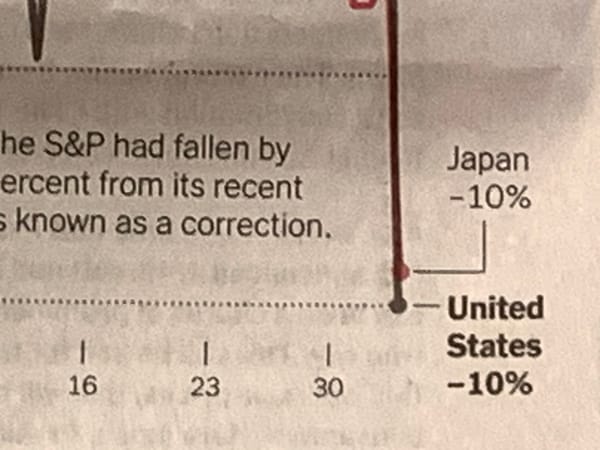Stop saying "imply"
INDIGNITY VOL. 4, NO. 17

MARKETING DEP'T.

Flaming Hydra Arrives Tomorrow!
DOWN TOWARD THE bottom of this newsletter, we've been telling you about the upcoming Flaming Hydra, a new cooperatively owned publication written by an all-star collection of independent writers and also by your Indignity editor and creative director. Now, up at the top of this newsletter, we're telling you that Flaming Hydra launches tomorrow!
Each weekday, starting January 30, subscribers to Flaming Hydra will receive a newsletter featuring pieces written by two different members of the cooperative, on a rotating basis. Everyone chips in their bit, and the readers get a steady diet of items. And if the readers keep on subscribing, the writers keep on chipping in, and the whole thing moves toward being a self-sustaining publication. Have a look!

USAGE NOTES DEP'T.

Implication Has Gotten Too Complicated
THERE WAS AN annoying argument going by on the internet this morning, the particulars of which have already blurred away in my mind. What it depended on, though, was that someone was writing that someone else had "implied" something.
It's time for everyone in the arguing business to concede that we can't say "imply" anymore. The word is functionally useless. Fog and corrosion have crept inside it, leaving it a dud in the arsenal of rhetoric.
This is a shame, because implication—or the power, through inference, to identify what's being implied—is an essential part of the process of understanding what anyone is saying. Elon Musk has never been seen posting "I'm a Nazi" or "I'm a white nationalist," and he probably never will; he just uses his social media platform to engage with and amplify various pieces of the messages of people who are Nazis or white nationalists, in a way that wouldn't make sense if his own world view didn't largely harmonize with theirs.
But if you point out that Elon Musk's performance on the platform formerly known as Twitter is implicitly anti-Semitic, the counterpoint is that Musk himself has declared he's not an anti-Semite. He then went on to ramble about being "aspirationally Jewish" in a way that implicitly—but, see, there it is again.
Implication is how you speak to an audience that shares your sympathies, while guarding against a less sympathetic hearing. Inference is how you interpret someone else's remarks, to an audience that shares your premises of interpretation. But now that everyone's remarks are simultaneously vibrating through multiple contexts at once, there's no way to pin down which interpretation is the fair and accurate one.
Donald Trump perfectly understands this. His whole political performance has been built on blaring implication, or insinuation, saying things by not-quite-saying them, leaving his supporters both able to understand what he means ("If you don't fight like hell, you're not going to have a country anymore") and able to accuse his critics of misunderstanding what he means ("peacefully and patriotically make your voices heard").
Take the whole open-ended question of whether or not Trump would be a dictator if reelected, overlaid by the question of whether or not Trump said he would be a dictator. Sean Hannity asked him if he would pursue retribution, and Trump replied, "Only on Day One." Trump then supplied something that superposed an elaboration with a non sequitur: "We're closing the border and we're drilling, drilling, drilling. After that, I'm not a dictator."
Implicitly, Trump said he would be a dictator. Explicitly, to the extent he said that, he added he would only briefly be one. He was so pleased with this formulation—yes, but also no, of course not—he rolled a version of it into his stage performance:
“I didn’t say that. I said I want to be a dictator for one day. You know why I wanted to be a dictator? Because I want a wall, and I want to drill, drill, drill,”
"I didn't say that," Trump said, about the thing he had said. Meanwhile, the real implications spill off in the opposite direction: what would happen if it took more than one day to get the wall built? Given that he didn't get it done in four years, last time around? What was Trump genuinely implying about how far he'd go, and for how long?
But the answers to these questions are in his record and the records of the people planning his next administration. They can't be extracted from a consensus reading of the text—and of the accompanying subtext—of his remarks. Trumpism exists to destroy the possibility of any such consensus, to make it as hard as possible for anyone to talk about what anyone else means.
Under these conditions, there's no use in discussing what someone "implied." Either they said it or they avoided saying it, and if they avoided saying it, they'll call you a liar for not being able to point to where they said it. Or—exposed to a constant flood of insincere and evasive arguments—you could be genuinely misreading their remarks, projecting something onto them that isn't there. The implication of all this is obvious: just say what they said, and describe what they did.

SIDE PIECES DEP'T.
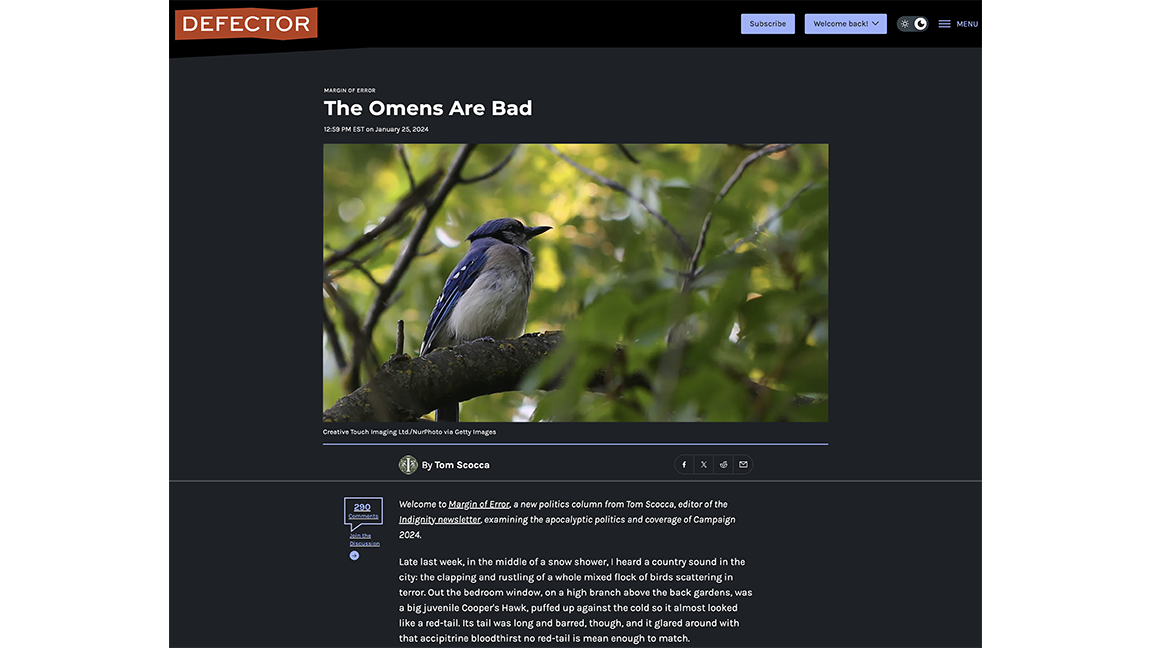
OUR PALS AT Defector—the reader-supported, cooperatively owned sports-and-more site that was born when everyone at Deadspin got fired or quit—asked your editor to write a twice-monthly column about politics and the media in the 2024 campaign season. In the opening installment, this past Thursday, I weighed reading the political coverage against just trying to find portents in the flights of the birds:
The paradox of the 2024 presidential race is that everybody already knows exactly what's going to happen, and nobody is prepared to even imagine the things that could happen. Donald Trump has been the Republican nominee, for all functional purposes, since Feb. 13, 2021, when 43 Republican senators voted to acquit him in his impeachment trial for inciting the January 6 attack on the Capitol. Joe Biden effectively became the Democratic nominee the same day, when his party began to realize that rather than possibly transitioning to a post-Trump era under a caretaker presidency, the Democrats were going to have to send their winner back out for a rematch with Trump.
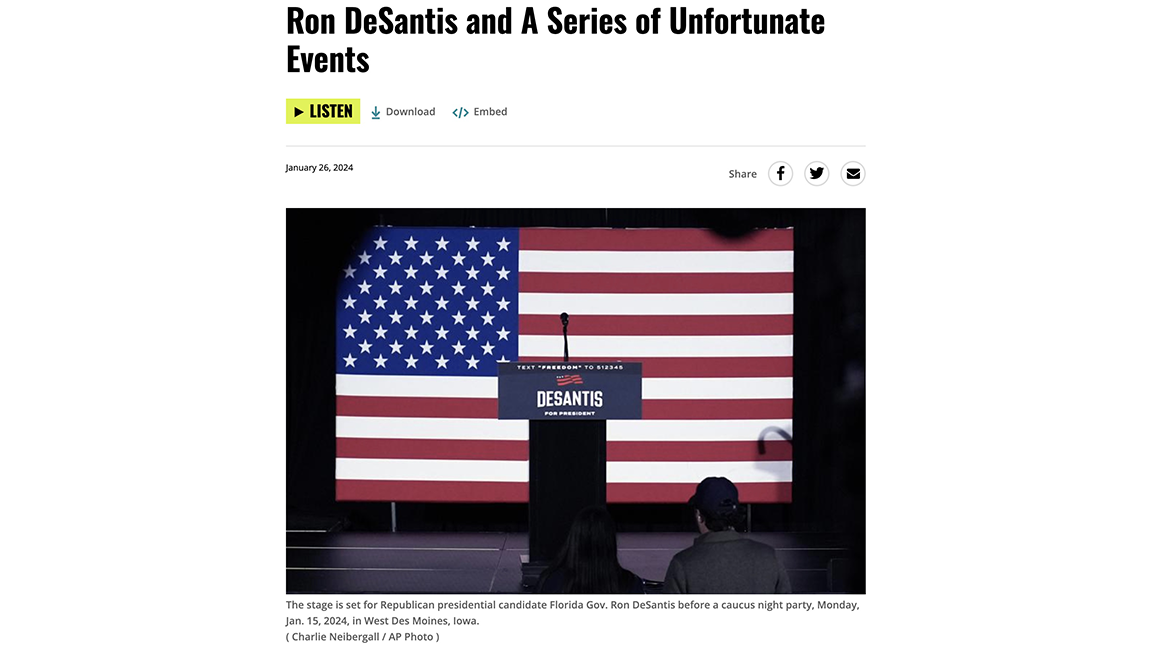
Last week I also talked to the people at WNYC's On the Media about the doomed Ron DeSantis campaign and why so much of the press wanted so badly to believe he could be a real candidate.

EASY LISTENING DEP’T.
INDIGNITY MORNING PODCAST
Indignity Morning Podcast No. 207: Fog of abstractions.
Tom Scocca • Jan 29, 2024


BLUESKY DEPARTMENT
READERS OF INDIGNITY who have previously benefited from the Bluesky-code generosity of other readers of Indignity continue to pay it forward and provide us with even more codes for the still-beta social network. If you haven’t already gotten a code from us, we have lots of codes. Email indignity@indignity.net and we will award Bluesky codes to those who respond, one per reader, first email, first served.

SANDWICH RECIPES DEP’T.
WE PRESENT INSTRUCTIONS for the assembly of sandwiches from The Butterick Book of Recipes and Household Helps, published by the Butterick Publishing Company in 1927, now in the Public Domain and available at archive.org for the delectation of all.
TWENTY SANDWICH SUGGESTIONS
- Raisins worked into Neufchatel cheese.
- Chopped raisins, figs, dates or prunes, and nut-meats moistened with mayonnaise dressing or lemon-juice.
- The well-whipped white of an egg mixed with a cup each of chopped raisins and nut-meats, seasoned with a little salt.
- Peanut butter moistened with salad dressing and mixed with raisins, dates, figs, or bananas.
- Equal parts olives, peanut butter, celery, mixed with a little salad dressing.
- Peanut butter mixed with chopped dill, sweet, or sour pickles.
- Cream cheese and chopped stuffed olives.
- Chopped stuffed olives and chopped nuts, moistened with salad dressing.
- Cream cheese and shredded pineapple between very thin slices of bread.
- Tunafish mixed with parsley, lemon-juice, seasoning, and a bit of onion.
- Cream cheese and chopped nuts.
- Ground boiled ham and chopped pickles or chopped peanuts.
- Cottage cheese and pickles, olives, nuts or pimientos.
- Currant jam with pounded walnut meats and creamed butter. Pass with cream cheese. Preserved currants may be substituted in this combination.
- Boston brown bread with cream cheese or mayonnaise and chopped nuts and raisins.
- Rounds of brown bread spread with chopped olives, minced lettuce and watercress, tarragon, paprika, parsley, and chives mixed with mayonnaise.
- Pimientos, cucumbers, and onion or chives, minced, mixed with mayonnaise and spread on buttered entire-wheat bread.
- Green pepper, pimiento, and olives with mayonnaise.
- Boston brown bread with minced corned beef seasoned with mustard and rubbed to a paste.
- Cream cheese used with chopped parsley, pimientos, and mayonnaise, chopped nuts, sliced sugared bananas, chopped pineapples, chopped or sliced olives, shredded sliced apples. The cheese may be rubbed with butter or the creamed butter may be spread on the bread.
If you decide to prepare and attempt to enjoy a sandwich inspired by this offering, be sure to send a picture to indignity@indignity.net.

MARKETING DEP'T. [CONT’D.]
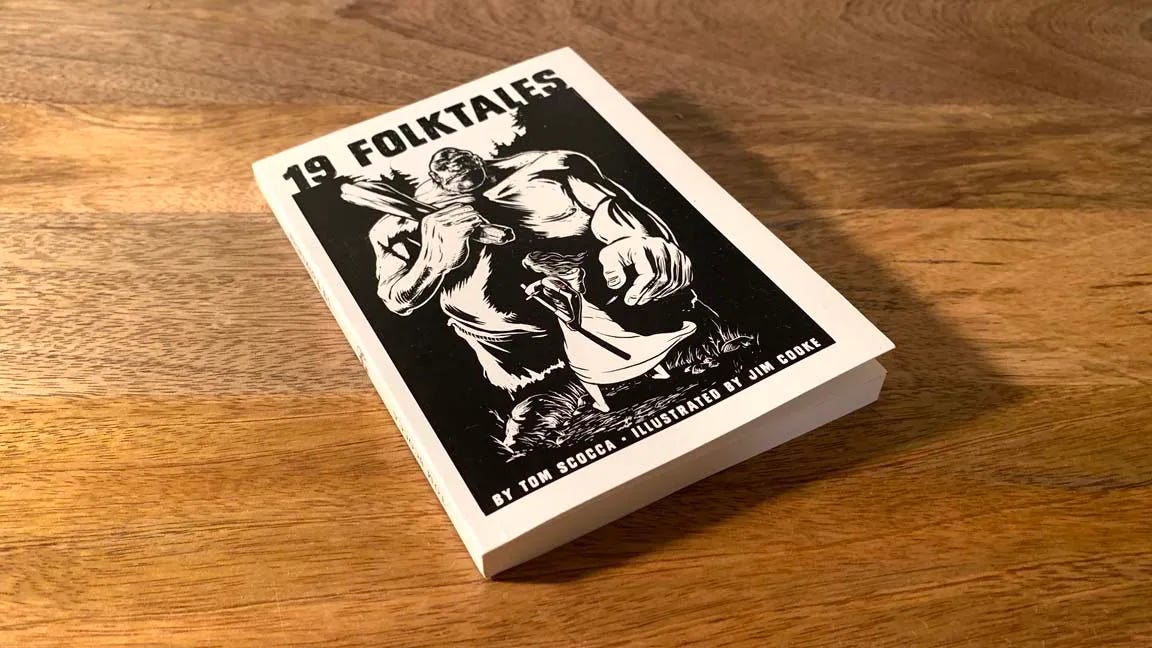
The second printing of 19 FOLK TALES is now available for belated Holiday gift-giving and personal perusal! Huddle up against the cold with a cozy collection of stories, each of which is concise enough to read within the snowy part of a wintry-mix storm.
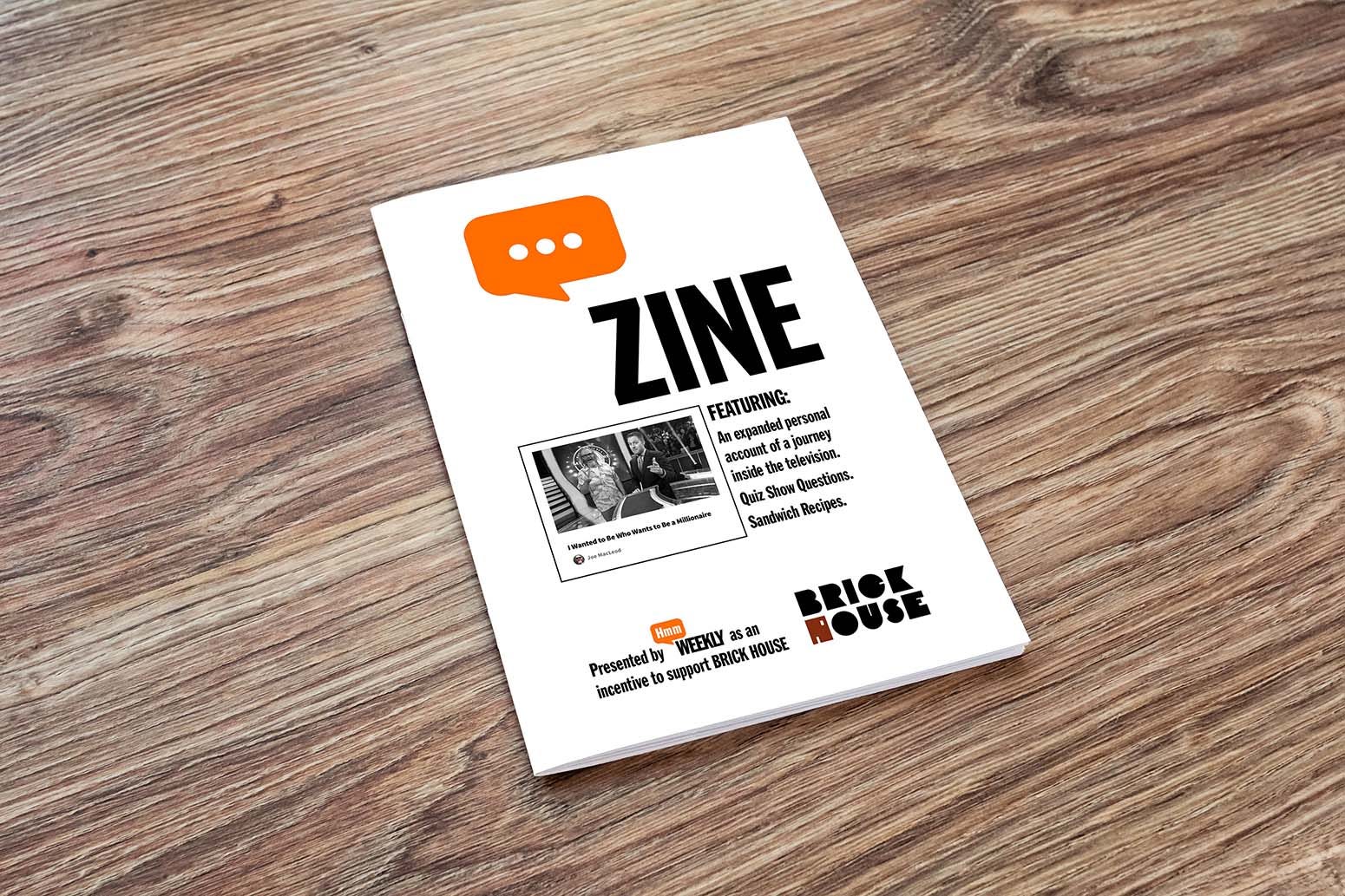
HMM WEEKLY MINI-ZINE, Subject: GAME SHOW, Joe MacLeod’s account of his Total Experience of a Journey Into Television, expanded from the original published account found here at Hmm Daily. The special MINI ZINE features other viewpoints related to an appearance on, at, and inside the teevee game show Who Wants to Be A Millionaire, available for purchase at SHOPULA.
INDIGNITY is a general-interest publication for a discerning and self-selected audience. We appreciate and depend on your support!




